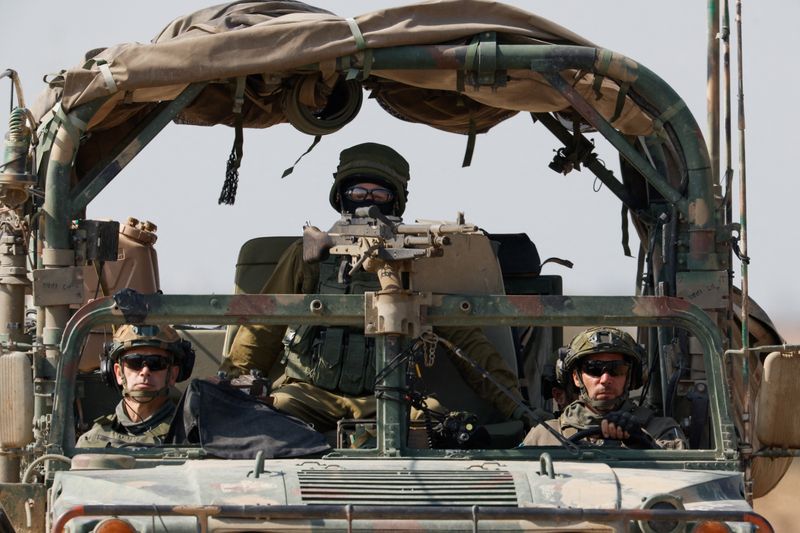
©Reuters. Soldiers sit in a military vehicle near the Israel-Gaza border, amid the ongoing conflict between Israel and the Palestinian Islamist group Hamas, in Israel February 28, 2024. REUTERS/Amir Cohen
2/2
By Nidal al-Mughrabi, Jana Choukeir and Maayan Lubell
CAIRO/DUBAI/JERUSALEM (Reuters) – Hamas called on Palestinians on Wednesday to march to Jerusalem’s Al-Aqsa mosque at the start of Ramadan, raising the stakes in ongoing negotiations for a truce in Gaza, which the government hopes American President Joe Biden. place for then.
Hamas leader Ismail Haniyeh’s call follows Biden’s comments that a deal could be reached between Israel and Hamas as early as next week for a ceasefire during the Muslim fasting month due to begin this year on March 10 .
Israel and Hamas, both of which have delegations in Qatar this week to hammer out details of a potential 40-day truce, have said there is still a big gap between them, and Qatari mediators say there is no breakthrough yet .
Al-Aqsa in Jerusalem’s Old City, one of the holiest sites in the world for Muslims and the holiest for Jews, has long been a flashpoint of potential violence, particularly during religious holidays.
With war raging in Gaza, Israel has said it may place limits on worship at Al-Aqsa during Ramadan based on its security needs. Many Palestinians reject any such restrictions on their access to the site.
“This is a call to our people in Jerusalem and the West Bank to march to Al-Aqsa from the first day of Ramadan,” Haniyeh said.
Israeli government spokesman Tal Heirich described Haniyeh’s remarks as “very unfortunate” and accused him of “trying to drag us into wars on other fronts.”
“We certainly don’t want that. We will certainly do whatever it takes to keep calm,” he said.
Israeli Defense Minister Yoav Gallant said Hamas’ goal is to ease pressure on its fighters in Gaza by forcing Israel to shift security assets to Jerusalem and the West Bank.
“We must not give it to them. On the one hand we are operating against terrorist elements and on the other it is our obligation to allow freedom of worship, and I think we will reach the right agreements that will allow this.”
Hamas, which precipitated the war in Gaza by attacking Israel on October 7, killing 1,200 people and taking 253 hostages by Israeli counts, has said it will not free all its prisoners without a comprehensive agreement to end the war.
Israel, which has attacked the Gaza Strip, killing 30,000 people according to Palestinian health authorities, says it will accept only temporary pauses in the fight to free the hostages, and will not end the war until Hamas is eradicated.
In a televised speech, Haniyeh said Hamas was showing flexibility in negotiations with Israel, but at the same time was ready to continue fighting. Israel has said any deal with Hamas would require the group to abandon what Israel describes as “extravagant demands.”
As part of the most serious push yet for a prolonged ceasefire, Hamas is considering a proposal, agreed by Israel in talks with mediators in Paris last week, for a 40-day truce.
A senior source close to the talks said the Paris text would see the withdrawal of Israeli troops from populated areas and the release of around 40 hostages, including women, people under 19 or over 50 and wounded, in exchange for around 400 Palestinian prisoners.
But it does not appear to satisfy Hamas’s demand for a permanent end to the war and Israeli withdrawal, nor to resolve the fate of dozens of Israeli hostages who are men of fighting age.
HANIYEH CALLS FOR MORE SUPPORT FROM THE ARAB STATES
Haniyeh also called on the self-styled Axis of Resistance – Iran’s allies including Hezbollah in Lebanon, the Houthis of Yemen and the Islamic Resistance in Iraq – as well as Arab states, to step up their support for the Palestinians in Gaza suffering under the assault and blockade of Israel. .
“It is the duty of Arab and Islamic nations to take the initiative to break the famine plot in Gaza,” Haniyeh said.
A Palestinian official familiar with the ceasefire talks told Reuters that mediation efforts were intensifying, but there was no certainty of success.
“Time is running out because Ramadan is approaching, mediators have stepped up their efforts,” the official said, “it is too early to say whether there will be an agreement soon, but things are not at a standstill,” he said.
Israeli Defense Minister Gallant, asked about Biden’s optimistic comments that a deal could be reached by next week, said: “Who am I to express an opinion on what the president said? I sincerely hope he’s right “.
Food aid reaching Gaza has fallen sharply in the past month and international aid agencies say residents are close to famine. Israel says the blockade of Gaza is essential in the war against Hamas and allows humanitarian aid to arrive.
On Wednesday, Israel said it partnered with the United Arab Emirates, Jordan, Egypt, France and the United States in an airdrop of food aid in southern Gaza.
In Rafah, where more than half of Gaza’s 2.3 million people are taking refuge, several masked men armed with clubs and some with guns toured markets in what they said was an attempt to keep the prices.
“Committee for the Protection of the People” is written on their scarves. A masked spokesman told reporters they were trained to support the Hamas-led Interior Ministry and to make sure people are not exploited.
Humanitarian agencies say the situation is most serious in the northern Gaza Strip, which has been almost completely isolated. Gaza’s Health Ministry said on Wednesday that four children had died from malnutrition and dehydration at the Kamal Adwan hospital in northern Gaza, which it had previously said had stopped operations because it ran out of fuel.
The Israeli military said it was checking the report.